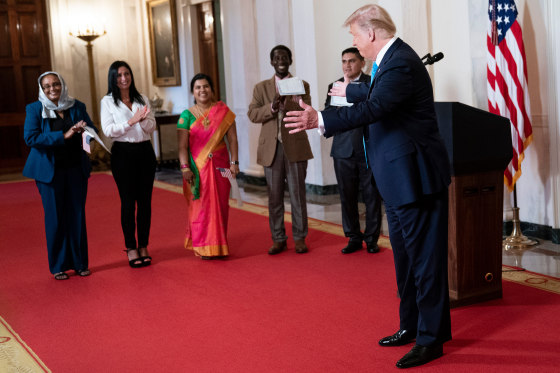Every year, more than 800,000 people take a 10-question civics test as part of the process of becoming a U.S. citizen. More than 92% pass on the first try.
But if you were to ask these same questions of President Donald Trump and his top advisers, I’m not sure if their answers would be accepted by a United States Citizenship and Immigration Services officer.
Let’s compare public statements from Trump and his allies with history and civics facts provided for test-takers by the U.S. government. Keep in mind that “passing” this portion of the test means merely getting six out of 10 questions correct.
What is the supreme law of the land?
Correct answer: the Constitution.
While speaking at a White House event for the National Governors Association in February, Trump asked Maine Gov. Janet Mills if she intended to follow his executive order on transgender athletes. She said her state would comply with state and federal laws. Trump responded, “We are the federal law.” It’s hard say exactly what Trump meant. Is he personally the law? Or the executive branch? Or the federal government? But any interpretation is hard to square with either the separation of powers or federalism, especially since Trump was referring to an executive order.
What is the rule of law?
Correct answer: No one is above the law.
In January, Trump posted a supposed quote from French emperor Napoleon Bonaparte on his Truth Social and X accounts, then reposted it from the White House X account and pinned it to the top of his feed. A day later, he reposted a variation of it with a portrait of Napoleon. The quote: “He who saves his Country does not violate any Law.”
Trump adviser Elon Musk, meanwhile, has been known to claim, “The only rules are the ones dictated by the laws of physics. Everything else is a recommendation.”
What stops one branch of government from becoming too powerful?
Correct answers: Checks and balances, or the separation of powers.
In a May 2024 podcast on President Joe Biden’s student loan forgiveness, now-Deputy FBI Director Dan Bongino openly laughed at the idea of checks and balances. “That’s really funny,” he told his listeners, arguing that “the only thing that matters” is power.
In response to an order from a judge barring the Department of Government Efficiency from accessing sensitive Treasury Department data, Vice President JD Vance posted on X that “Judges aren’t allowed to control the executive’s legitimate power.” Around the same time, Trump said at a news briefing, “It seems hard to believe that a judge could say, ‘We don’t want you to do that,’ so maybe we have to look at the judges because I think that’s a very serious violation.”
Musk has gone even further, calling for the firing of federal judges, who serve lifetime appointments under the Constitution. “This evil judge must be fired!” he posted on X in February, in an apparent reference to Judge John Bates. (Bates has ruled against the Trump administration in recent months and presided over multiple Jan. 6 riot cases.)
Under our Constitution, some powers belong to the states. What is one power of the states?
Correct answers: Provide schooling, provide police and fire departments, issue driver’s licenses, approve zoning and land use.
Speaking at the National Republican Congressional Committee in April, Trump called for a federal bill on elections, which are run by the states under the elections clause of the Constitution. “The states are just an agent of the federal government,” he said. To be fair, Trump is correct that Congress has some power over elections, but his description of states as agents of the federal government does not jibe with the general principles of federalism.
What are two rights of everyone living in the United States?
Correct answers: Freedom of speech, freedom of assembly, freedom to petition the government, freedom of religion and the right to bear arms.
Trump has argued that he “brought back free speech in America,” but critics have questioned his administration’s actions. Speaking to reporters during a trip to Ireland in March, Secretary of State Marco Rubio defended his decision to revoke the visas of foreign students at U.S. universities who protested the war in Gaza. “This is not about free speech,” he said. “This is about people that don’t have a right to be in the United States to begin with. No one has a right to a student visa. No one has a right to a green card.” However, as the citizenship test notes in the question itself, the First Amendment applies to everyone living in the United States, not just U.S. citizens.
These are not the only examples of problematic statements from Trump and his advisers on the basics of American democracy, but they are five that are most directly addressed by the citizenship test.
Trump has also posted on Truth Social an image of himself wearing a crown with the phrase “LONG LIVE THE KING!” over a dispute on congestion pricing in New York City.
He’s also mangled the number of articles in the Constitution (it’s seven), telling House Republicans, “I’m for Article I, I’m for Article II, I’m for Article XII.” And in a Truth Social post in 2022 that made false claims of election fraud, he called for the “termination of all rules, regulations and articles, even those found in the Constitution.”
While those basic factual inaccuracies are unlikely to come up during a citizenship test, they certainly would raise eyebrows if you volunteered them at a naturalization hearing.

